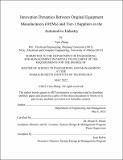Innovation Dynamics Between Original Equipment Manufacturers (OEMs) and Tier-1 Suppliers in the Automotive Industry
Author(s)
Zhang, Yuru
DownloadThesis PDF (19.58Mb)
Advisor
Moser, Bryan R.
Terms of use
Metadata
Show full item recordAbstract
Over the past seven decades, the automotive supply chain has been restructured to a tiered system. OEMs and tier-1 suppliers innovate together through joint product development programs: each OEM has multiple suppliers working on different subsystems, and one supplier may offer similar subsystems to multiple OEMs. This work focuses on the relationship between OEM and tier-1 suppliers that focuses on both parties’ interests with a balance in the coexistence of competition and collaboration, using objective data sources. Treating the OEM, its tier-1 supplier, and the competitors in the whole product market as a system, a system-level quantitative study on the buyer-supplier relationship is conducted. A system dynamics (SD) model is proposed to describe the dynamics in an OEM-supplier relationship. To validate the model, the author collects non-subjective data and performs empirical studies on two subsystems – passive keyless entry (PKE) and high-speed transmission (HST) between the model years 2004 and 2021. The empirical studies validate the hypothesis that the outcomes of competitive and collaborative behaviors on the whole product competitiveness depend on market competition, which is reproducible by the model: when the market is stable, the more competitive party in a relationship has a better financial outcome; when the market is highly competitive, collaborative behaviors boost the long-term performance of the OEM-supplier ecosystem. The study also shows that the proposed model delivers accurate predictions with non-subjective inputs when heavy dependence is present in an OEM-supplier relationship.
Date issued
2022-05Department
System Design and Management Program.Publisher
Massachusetts Institute of Technology